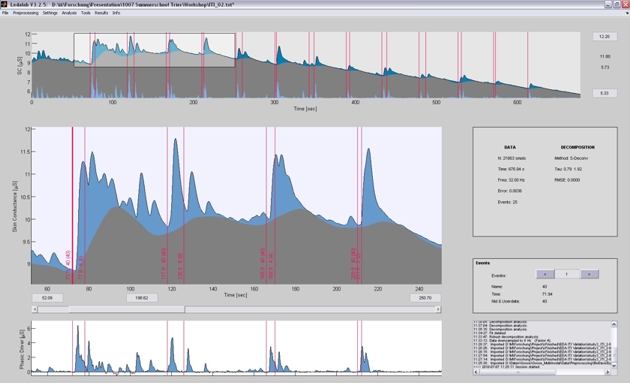Ledalab ..
- is a Matlab-based software for the analysis of skin conductance data (SC; i.e., EDA, GSR).
- can import various file formats (including BioPac, Biotrace, CassyLab, PortiLab, PsychLab, VarioPort, VisionAnalyzer, VitaPort) and provides many preprocessing functions.
- performs event-related analysis relative to events/marker and returns various parameters of phasic and tonic activity.
- can be used via an interactive GUI or in an efficient batch-mode via the Matlab command window.
- currently provides two EDA analysis methods:
(1) The Continuous Decomposition Analysis (CDA) performs a decomposition of SC data into continuous signals of phasic and tonic activity. This method takes advantage from retrieving the signal characteristics of the underlying sudomotor nerve activity (SNA). It is beneficial for all analyses aiming at unbiased scores of phasic and tonic activity.
(2) The Discrete Decomposition Analysis (DDA) perfroms a decomposition of SC data into distinct phasic components and a tonic component by means of Nonnegative Deconvolution. This method is especially advantageous for the study of the SCR shape.
- has been used at more than 60 universities and research facilities (including Aachen, Atlanta, Austin, Bangalore, Beijing, Berlin, Bern, Bielefeld, Budapest, Buenos Aires, Coimbra, Cornell, Delft, Dresden, Duisburg, Eindhoven, Florida, Freiburg, Friedburg, Geneva, Georgia, Göttingen, Graz, Hannover, Helsinki, Indiana, Iowa City, Karlsruhe, Kiel, Köln, Lausanne, Lancester, Leipzig, London, Los Angeles, Lübeck, Lyon, Mainz, Mannheim, Minnesota, Montreal, München, Newark, Nijmegen, Nottingham, Novosiborsk, Oldenburg, Osnabrück, Oslo, Rennes, Rostock, Singapore, Stuttgart, Tel Aviv, Trento, Trier, Triest, Tübingen, Twente, Ulm, Utrecht, Warsaw, Washington, Wien, Wuppertal, Zurich).
- has been frequently cited in previous research: JNM-paper, PSYP-paper
- is licensed under the GNU General Public License.
Screenshot of Ledalab V3.2.5
Events and papers:
- 2014-01-31. Ledalab-Workshop at University of Vienna, Cognitive Science Research Platform
- 2012. Publication recommendations for electrodermal measurements published by SPR (adressing decomposition methods for avoiding issues with overlapping SCRs imlpemented in Ledalab)
- 2012. 2nd revised edition of Electrodermal Activity by W. Boucsein (adressing decomposition methods imlpemented in Ledalab)
- 2012-07-02. Ledalab-Workshop at ZI Mannheim
- Benedek, M. & Kaernbach, C. (2010). A continuous measure of phasic electrodermal activity. Journal of Neuroscience Methods, 190, 80-91. [link]
- Benedek, M. & Kaernbach, C. (2010). Decomposition of skin conductance data by means of nonnegative deconvolution. Psychophysiology, 47, 647-658. [link]
- 2010, September. Current developments in methods and application of skin conductance measurement. Symposium at the DGPS 2010. Bremen, Germany. Contributions by D. Bach (London), L. Michael (Berlin), W. Kallus (Graz), M. Benedek (Graz), C. Kaernbach (Kiel)
- 2010, July. Benedek, M., Analysis of EDA using deconvolution methods. Talk and Workshop at the Trier Summer Symposium of Stress 2010. Tier, Germany.
- 2010, March. Kaernbach, C. & Benedek, M., New Methods for the analysis of skin conductance data. Talk at the TeaP 2010. Saarbrücken, Germany.
- 2009, June. Methods and application of skin conductance measurement. Symposium at the APM 2009. Leipzig, Germany. Contributions by W. Boucsein, R. Schleicher, A.-K. Bräscher et al., M. Benedek, C. Kaernbach
- 2008, September. Benedek, M. & Kaernbach, C. Decomposition of skin conductance data by means of deconvolution. Talk at the 39th Meeting of the European Mathematical Psychology Group (EMPG). Graz, Austria. [Abstract, p.18]
The development of Ledalab was supported by the FWF (P19276)
